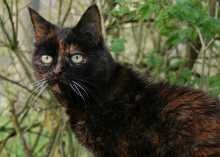Older Cat Losing Weight: What Could Be The Cause?
A skinny old cat is probably a sick old cat
As cats age, it's common for them to lose weight suddenly - or over the course of several months - for no apparent reason. Often, these cats will show no symptoms other than the weight loss. Many cat owners conclude that their cat is "just skinny" or that this is part of the natural process of getting older.
But it isn't! Most likely, an older cat's weight loss is caused by one of three common conditions. All of these conditions are easily treatable, which can give your cat several more years of comfortable, healthy life.
Other symptoms often include a poor coat quality, lack of grooming, a change in the amount of food your cat eats (either a lot more, or a lot less), vomiting, and drinking more water. Be sure to note any of these symptoms so that you can tell your vet.
These conditions are easy for your veterinarian to diagnose and treat. If you are worried about the expense, talk to your vet - they are used to having this conversation with pet owners, particularly owners of older pets. The initial diagnosis will probably involve a simple blood panel work-up.
A cat's thyroid gland is what regulates how quickly they metabolize their food. If the thyroid is hyperactive, it causes your cat's metabolism to go into high gear. In addition to weight loss, your cat may eat and drink more than usual. Hyperthyroidism is common in cats who are over the age of 10.
Hyperthyroidism is usually treated simply by giving the cat a dose of liquid medicine once a day.
Just like people, older cats are at risk of contracting diabetes - especially if they were overweight to begin with. A diabetic cat may lose weight, and may drink a lot more water than usual.
Diabetic cats will need to have their diet managed more closely than "regular" cats, and will probably need to receive insulin. But don't worry - the insulin jabs don't hurt the cat, and if you are squeamish about giving your cat shots, you will get over it and it will quickly become second nature.
If a cat's kidneys begin to fail, toxins can build up in the cat's bloodstream that cause them to be sick and feel poorly. Kidney failure often causes your cat to drink a lot more water than usual, trying to make up the difference in blood volume.
Kidney failure can be controlled by giving your cat subcutaneous fluids daily. Just as with insulin, this doesn't hurt your cat, and quickly becomes second nature for you.
